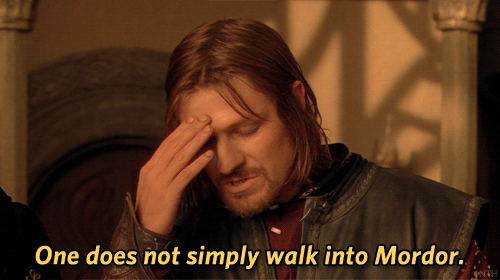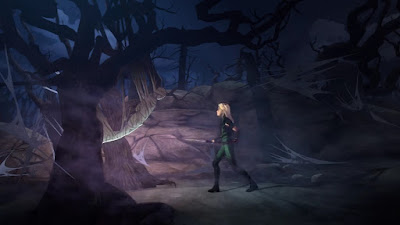Read the previous entry here.
Read the next entry here.
Intrigues deepen, both political and mystical.
2.4, "Voyage of the Ruthless"
Written by Neil Mukhopadbyay
Directed by Villads Spangsberg
Synopsis
 |
Honestly, I'm impressed by the bird.
Image taken from the episode, used for commentary.
|
Following their escape from Soren and Claudia, Ezran, Callum, and Rayla continue eastward, carried by a phoenix. Callum attempts to commune with nature en route; Rayla chides him for it. The phoenix begins to falter from flying for so long with such weight, and it falls to earth.
Elsewhere, Amaya surveils the separation of Xadia from the western, human lands. She suspects that a forward position has been compromised, and she orders a sortie to determine the truth of it.
 |
Ginsu, it ain't.
Image taken from the episode, used for commentary.
|
In Katolis, Viren continues to investigate the mirror. The figure within communicates with him via pantomime. Viren follows along with what seems to be a magical ritual, although not without his suspicions.
 |
"Hello, again, fellow humans, human fellas!"
Image taken from the episode, used for commentary.
|
Ezran, Callum, and Rayla send the phoenix back to Lujanne and continue their journey. They purpose to take a boat across the bay that lies in their path, and they enter a port town to secure passage. Rayla resumes her "
human disguise," entertaining Ezran immensely; Callum leaves Rayla behind as he and Ezran seek a captain. They find one in the blind Villads, and they arrange passage aboard his ship, the
Ruthless. Despite the oncoming heavy weather, they proceed across the bay.
Villads proves an adept sailor, explaining seacraft to Callum in a way that suggests the possibility of his own connection to the skies and their magic. The coming storm approaches, and the Ruthless is obliged to put in on the lee side of an island by the wind and rain.
Viren follows the mirror-figure through the beginning of the ritual, mimicking its motions and channeling power between the pair of them. He hesitates at bloodletting, however, disappointing the mirror figure, whose identity remains unclear to him.
 |
Quite the entrance.
Image taken from the episode, used for commentary.
|
Amaya leads her sortie to the forward outpost. She finds that it has been compromised, and a fracas ensues. Her forces are beset, and
her earlier opponent returns. Amaya acquits herself well and secures her troops' escape, retreating with them back to a more fortified location.
Aboard the Ruthless, Callum purposes to connect to the skies. He remains out in the storm in an attempt to activate his message; Azymondias accompanies him, and the two leave the ship for the shore. Callum's efforts do not go well for him; his folly in enacting them does not help matters, though he does recognize his error.
 |
Message for you, sir!
Image taken from the episode, used for commentary.
|
Viren considers the ritual as he sees messages return. He finds that they are from the other human kingdoms, agreeing to a summit. The news pleases him. When he returns to his sanctum, he covers the mirror.
Callum returns to the Ruthless, abashed. Rayla welcomes him back.
Discussion
The episode engages in some anachronism (in addition to the repeated reference to Martin via crow-messenging), which is not uncommon in medievalist works. For one, the Ruthless and her captain partake greatly of stereotypical pirate trappings, common enough in otherwise medieval-styled milieux (as noted here and here, among others). For another, Callum makes note of lightning rods, using the term, and while it might well be thought that a medieval person would see lightning striking tall objects more frequently than short ones, it is not until the eighteenth century that the term and the device came into use; the lightning rod is at least as post-medieval as the "typical" pirate. As in other examples, though, the anachronism serves to make the episode more accessible to audiences that typically compress all but the most recent past into a single, monolithic concept, as well as to allow for some narrative motions that would otherwise be difficult to carry out.
Too, the anachronism serves a useful purpose in reinforcing the fiction of the series. Because things are not in it as they were in the audience's world, although they are similar in many ways, the series is insulated from a number of concerns with which its presumed secondary audience--parents of the children likely to be watching, that is, or people like me--would be familiar. I am not alone in remembering the Satanic panic of the late 1980s and early 1990s, the protestations of Pat Pulling and those who heeded her; among the "concerns" was that "the things in fantasy are too real." While such things are erroneous, clearly, worries about similar reactions persist--and they are, in some senses, allayed by introducing eminently inaccurate elements into the narrative. Such elements provide some cover--an unfortunately still-needed thing.













































